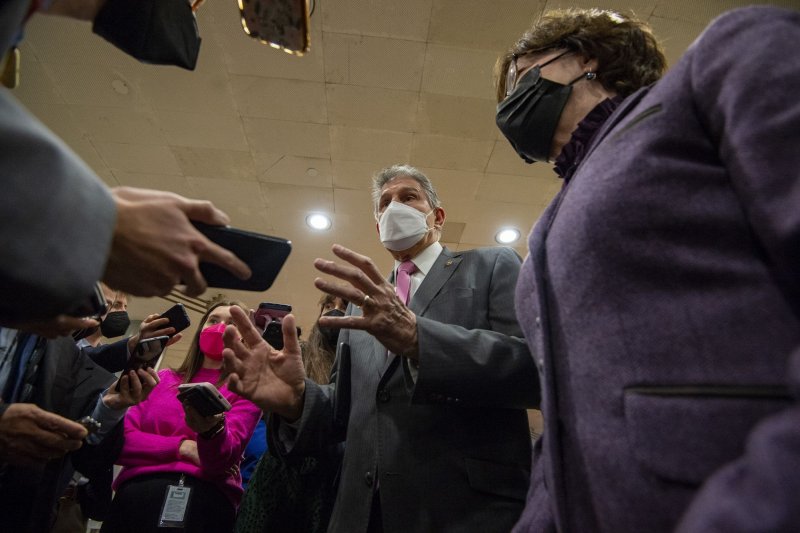1 of 4 | Sens. Joe Manchin, D-W.Va., and Susan Collins, R-Maine, speak to the press in the Senate subway at the U.S. Capitol in Washington, D.C., on Thursday. Photo by Bonnie Cash/UPI |
License Photo
Jan. 20 (UPI) -- Various political leaders, activists and advocacy organizations expressed disappointment on Thursday toward Senate Republicans and two Democrats after they blocked efforts to pass voting rights legislation that's designed to safeguard Americans' right to vote.
Senate Democrats, other progressive lawmakers and President Joe Biden pushed for the passage of two voting rights bills in the upper chamber -- but those efforts failed Wednesday when GOP senators and moderate Democratic Sens. Joe Manchin of West Virginia and Kyrsten Sinema of Arizona refused to support them.
The Senate vote was 51-49, leaving Democrats short of the 60 votes needed to advance The Freedom to Vote: John R. Lewis Act less than a week after the House voted in favor of the bill. Manchin, Sinema and all Senate Republicans voted against the measure. When that failed, an effort to get around a GOP filibuster and pass the bill with a simple majority vote, known as the "nuclear option," also failed.
Biden expressed "profound" disappointment on Wednesday over the failure, saying that Republican-led states are making it tougher for Americans to vote. A number of prominent figures have since joined the president in frustration.
Stacey Abrams, a voting rights activist and gubernatorial candidate in Georgia's 2022 election, condemned the Republicans and Manchin and Sinema for uniting to block voting rights reform.
"52 Senators -- two Democrats and all Republicans -- failed their voters, allowing the filibuster to stand in the way of critical voting rights legislation," she said in a tweet.
"But we are determined to continue this fight on the ground here in Georgia. Because we must. Join us."
House Speaker Nancy Pelosi said Senate Republicans dishonored the leadership of Dr. Martin Luther King Jr. by "blocking passage of urgently needed legislation to protect voting rights and our democracy."
"Right now, our nation faces the most severe and sinister threat to our democracy since the era of Jim Crow," she said in a statement. "Yet, an arcane Senate Rule -- one that clearly conflicts with the intentions of our founders and has long been used to block progress on civil rights -- continues to stand in the way of enacting this vital legislation."
The filibuster is a Senate rule requiring 60 votes to get most legislation to a vote. It's not required in the U.S. Constitution. It dates back to 1805 when Vice President Aaron Burr urged the Senate and House to drop "previous question rules" that allowed simple majority rules voting on legislation.
The senate dropped that rule, creating a loophole that allowed senators to speak as long as they want to in order to block legislation they don't support. The House didn't adopt it, so it has no filibuster today.
The modern filibuster arrived in 1917 when President Woodrow Wilson, frustrated by filibuster obstructionism, urged adoption of a new cloture rule. That rule allowed filibusters to be stopped by a supermajority, or two-thirds vote of the Senate. By 1970, that was changed to 60 votes.
In 1957, Sen. Strom Thurmond, D-S.C. set a personal filibuster speaking record of 24 hours, 18 minutes to block the 1957 Civil Rights Act. It was used again by southern senators to try to block the 1964 Civil Rights Act, which delayed passage for 60 days.
![]()
House Speaker Nancy Pelosi, D-Calif., speaks to the press Thursday at the U.S. Capitol in Washington, D.C. In her remarks, Pelosi urged Democrats against infighting after an effort to pass a landmark voting rights bill was blocked by two members of the party on Wednesday. Pool Photo by Rod Lamkey/UPI
"The fight for the vote is worth fighting," former first lady, U.S. senator and Secretary of State Hillary Clinton said in a tweet Thursday. "This struggle did not begin with us, and we will not let it end with us. Onward."
"52 U.S. Senators blocked voting rights legislation. Some of them tweeted on [Martin Luther King Day], while resolutely opposing legislation to prevent states from suppressing the votes of Black, Brown & rural communities," Rep. Cori Bush, D-Mo., tweeted. "These Senators invoke a martyr, while castigating his legacy & teachings."
"The U.S. Senate failed to stand up for the fundamental right to vote of all Americans and dealt a seismic blow to our democracy by defending an archaic rule at the expense of American voters, particularly voters of color," Southern Poverty Law Center President Margaret Huang said in a statement. "Allowing a minority of politicians to block essential voting rights legislation supported by a majority of Americans and a majority of U.S. Senators is unacceptable and indefensible."
Republicans who voted against the effort defended their vote, arguing that Democrats attempted to change the "structure" of the U.S. Senate.
"We just beat back one of the most radical efforts in the history of the United States Senate," Sen. Lindsey Graham, R-S.C., said in a tweet late Wednesday.
"However, I fear tonight was the beginning of the end of the Senate being the legislative body that stands in the way of radical change by either party."
Senate Republican leader Mitch McConnell drew some criticism Thursday for his remarks about blocking the Democratic efforts in which he distinguished between African Americans and "Americans."
"The concern is misplaced," he told a reporter. "Because if you look at the statistics, African American voters are voting in just as high a percentage as Americans."
Speaker of the House Nancy Pelosi, D-Calif., discusses President Joe Biden's first year in office during her weekly press conference at the U.S. Capitol on Thursday. Photo by Bonnie Cash/UPI |
License Photo

















